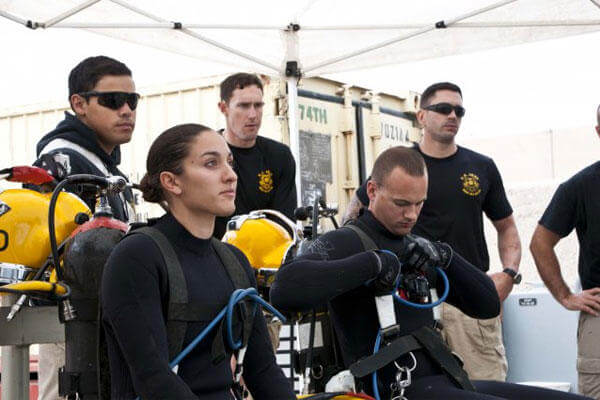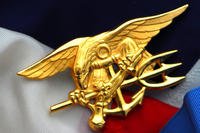SHUAIBA PORT, Kuwait-- Just as the Spartans defied the odds and held off thousands of enemy troops, a modern-day female Soldier of Greek descent showed the same determination in her pursuit of becoming one of only four female-divers in the history of the U.S. Army.
One might even conclude that she's related to the famous Spartans. If the ancestral blood of the Spartans is indeed flowing through her veins, then the never-give-up mindset has transcended the ages.
This petite young woman relentlessly pursued her dream of becoming a diver while navigating a world dominated by men. She displayed the same "grit-and-grind" resolve showcased by Demi Moore on the big screen.
"I thought it was going to be like the movie 'G.I. Jane,' that was going to be me," said 1st. Lt. Christie Plackis, the executive officer assigned to the 74th Engineer Dive Detachment, deployed from Joint Base Langley-Eustis, Va.
Her parents never served in the military, so she had no idea what Army life was all about. At eight-years-old, she began swimming competitively, which prepared her for her destiny; being a diver. Her connection with the water was constant during her high school and college years, which included coaching and lifeguarding, which kept her in peak physical shape for the challenges that she'd face.
In 2007, Lt. Col Kent Rideout, her Army ROTC commanding officer at San Diego State University, informed her that Army officers could become divers. Thus, the flame was lit and its never burned out. Since then, she's never looked back.
"This is what I'm going to do," stated Plackis with confidence. "I don't care that the numbers are against me or that I'm the only female."
At the Basic Officer Leader Course at Fort Leonard Wood, Mo., she'd ask anyone who mentioned divers to elaborate. Many times, the responses weren't pleasant.
"I was so excited to be a diver that I asked an instructor questions about the dive field," said Plackis. "When I told him I wanted to become a diver, he responded by saying, 'nope, you're too small and weak.'"
This type of response was all too familiar to this small-framed young woman. She let it roll off her, like water off a duck's back.
"There were a lot of haters. I had to step back and remind myself that they don't even know me," said Plackis. "It just fueled the fire to train harder. It made the fire even bigger. It made me angry but determined, it motivated me."
Every evening after the long grueling days spent learning her new career, she continued swimming until the day of tryouts. In diving, being prepared mentally and physically is the only way to have a fighting chance of making the cut.
The Dive Officer Selection Board, consisting of leadership from the Army engineer diving field, interviewed Plackis after she endured an extreme water physical fitness assessment lasting several hours.
"It's pretty cool, she was gung-ho, ready to duke it out with the guys straight off the bat," said Spc. Dagan Indeck, a second-class diver who spent every step of training with her and now serves in the 74th EDD along with her. "She's not held to a different standard. She had to pass the same physical fitness test for divers, male or female."
After surviving three physically intensive weeks of training during phase one dive school, she advanced to phase two in February of 2011. She spent six months devouring each and every aspect of Army diving at the Naval Diving and Salvage Training Center, Panama City, Fla.
"I liked PT, but it was always one of those morale killers for me, everyone else finished before me during CrossFit," as Plackis recalled those strenuous physical fitness routines consisting of 100 pull-ups, 500 push-ups and other extreme exercises.
Army and Navy divers train together during dive school. One of her classmates, a Navy diver, who had traditional views regarding who should be there, pulled her aside before he graduated and told her something unexpected.
"I don't know how to tell you, I have a lot of respect for you," said this diver, who in her mind, was always her biggest critic. "You worked so hard on your push-ups and pull-ups after duty hours. During the toughest times, watching you made us say, 'How can we quit? If she can do it, we can do it too."
"I was so encouraged. I realized in dive school that my presence, my existence, makes people better," said Plackis. "Just the fact that I am there and not quitting, meant they weren't going to quit. I went there to meet the standard, I didn't go there to do less."
This can-do attitude earned her the respect of not only the dive instructors, but also an instructor who currently serves as the master diver in her unit.
"In the past, women weren't typically allowed or didn't make it through dive school. Most failed the pull-ups," said Master Diver Sgt. 1st Class Michael Randall. "Not with her. I was there when she first started and throughout her training there was no question that she would finish. She definitely wasn't pushed through."
Besides just exceeding the standard to prove herself among the male divers, she also brought a spiritual connection that burned like the sun.
"I gave it a 110 percent, but something could've gone wrong and I could've not been picked," said Plackis who used her faith to pick herself up in those times filled with doubt. "The biggest thing is how much a role God played in my life by giving me the motivation to train up as hard as I did; He got me through every step of the way."
By channeling her love of swimming, personal courage and spiritual beliefs, she was able to succeed where every other woman, except three, have failed and solidifying her place in woman's history. Being the fourth to carry the torch she's overcome many physical and mental challenges, even when some were questioning her place in the diving world. Today, her unique position as a role model could be used to encourage young women to follow their dreams, regardless of difficulties and challenges they may face.


























